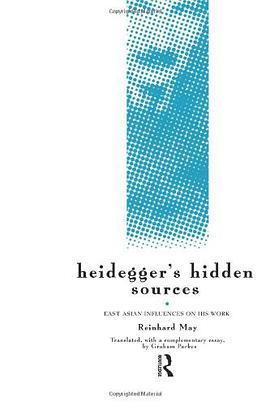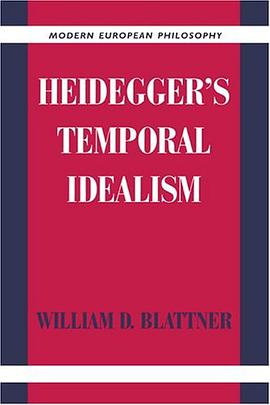

具体描述
"Heidegger Beyond Deconstruction" argues that Heidegger's question of being cannot be separated from the question of nature and culture, and that the history of being describes the growing predominance of culture and technology over nature, resulting in today's environmental crisis. It proposes that we turn to Heidegger's thought in order fully to understand this crisis.In doing so it is necessary to retrieve those elements of his thought which are most maligned by Derridean deconstruction: the pastoral, the homely, the local. In a world coming to terms with the destructive nature of 'globalisation' and the networks of distribution and travel which lacerate the globe, we are witnessing a gradual return to the 'locally produced', the 'organic', the 'micro-generation' of energy unplugged from the national and international grid: in other words, a return to the 'near'. The necessities and problems inherent in this return, which the 'environmental movement' must address, are already to be found in Heidegger's thought.Lewis confronts this thought with that of Lacan, Levinas, Zizek, and Marx in order to reinvent the element to which deconstruction usually confines it and bring it into a position from which to confront the most pressing ethical and political questions of today.
作者简介
目录信息
读后感
评分
评分
评分
评分
用户评价
这本书的叙事构建犹如一场精妙的迷宫,初读之下,便被卷入作者精心编织的哲学图景之中。它没有直接诉诸于清晰的论断,而是通过一系列看似松散却又暗含深意的文本碎片,引导读者去重新审视那些我们习以为常的观念。那种体验,仿佛置身于一幢古老的大教堂里,光线从斑驳的彩色玻璃窗洒下,每一个角落都隐藏着不同的光影和历史的低语。作者对概念的解构并非简单的拆解,而更像是一种炼金术,将旧有的意义熔化,再以一种近乎有机的方式重塑。我尤其欣赏其中关于“在世存在”与“技术本性”之间那种微妙的张力,它不像教科书那样板正,反而充满了生命力的辩证。读完后,我感觉自己仿佛完成了一次漫长的徒步旅行,沿途的风景不断变化,最终抵达的那个展望点,虽然有些模糊,但视野却异常开阔。那种意犹未尽的思辨冲动,是检验一本优秀哲学著作的试金石,而这本书无疑做到了这一点。
评分阅读此书,就像是进行了一次精神上的“慢食”体验,要求你细细品味每一口思想的质地。作者的笔触在宏大理论的描摹和对日常经验细致入微的捕捉之间自由切换,这种结合赋予了文本非凡的生命力。我惊讶于作者如何在如此抽象的领域中,依然能保持一种近乎诗意的语言张力。那些关于存在感的论述,没有落入空泛的抒情,而是被严谨的思辨所支撑,如同精工细作的建筑,既有宏伟的蓝图,又不失砖瓦间的纹理。这本书成功地提供了一种新的视角,让我们得以审视知识的生产过程本身,以及语言在塑造现实中所扮演的角色。它不是一本可以被迅速“消化”的作品,而是需要被反复沉淀、并在日常生活中不断对照反思的工具书——虽然它看起来绝不像传统意义上的工具书。
评分我必须承认,这本书的阅读过程是一场对耐心的严峻考验,但回报却是丰厚的。作者的行文风格极其内敛,充满了对语言界限的试探。他似乎总是在谈论某事,但又不直接触碰核心,而是绕着它舞蹈,用一系列复杂的句式和隐喻来构建他的论点。这不像是一本向导手册,更像是一份晦涩的航海日志,记录着作者在思想海洋中遭遇的风暴与平静。我花了大量时间在某些段落前反复咀嚼,试图捕捉那些稍纵即逝的洞见。比如,他对主体性消解的描绘,其细腻程度令人咋舌,它没有采用激烈的批判口吻,而是以一种近乎冥想的平静,揭示了现代人精神困境的根源。这种深邃感,需要读者投入极大的心智资源去捕获,但一旦领悟,那种豁然开朗的感觉,绝对值得所有的努力。它挑战了我们对清晰表达的固有偏好,转而颂扬了深层意义的复杂性。
评分这本书的结构安排简直是一场关于阅读体验的实验。它不是一个线性的论证链条,而更像是一部由多个互相关联的乐章组成的交响曲,每个章节都有其独特的节奏和调性,但共同服务于一个宏大的主题。我在阅读过程中,时常会感受到一种被推向边缘的紧张感,作者似乎总是在逼近某个临界点,然后又巧妙地后退,留下一个真空地带供读者自行填补。这种留白处理得极其高明,它有效避免了将复杂的哲学问题庸俗化或简化。我感觉作者在极力避免使用任何陈词滥调或预设的术语框架,而是努力创造出一种属于他自己的、更为原始和纯粹的语言环境。这种对表达纯净度的不懈追求,使得整本书散发出一种既古典又前卫的独特光芒。它要求读者不仅仅是理解文字,更是要体验文字背后的心智活动。
评分如果说阅读是一场对话,那么这本书提供的则是一次与一位极具洞察力但又极其沉默的智者的交谈。作者的表达方式充满了张力,他既是导游,又是谜语的制造者。我特别喜欢那种在看似毫不相关的两个概念之间建立起令人惊奇的桥梁的写作手法。这种跨越式的联想,并非故弄玄虚,而是揭示了事物背后隐藏的同构性。从字里行间流露出的那种对西方形而上学传统的深刻理解和审慎的疏离感,令人印象深刻。它没有急于给出答案,而是更专注于提出更尖锐、更具穿透力的问题。对于那些习惯了快餐式知识的读者来说,这本书可能会显得有些疏离和晦涩,但对于愿意沉浸在细微之处、探究思想深层结构的人来说,它无疑是一座知识的宝库。它迫使我们放慢速度,重新学习如何“观看”和“思考”。
评分 评分 评分 评分 评分相关图书
本站所有内容均为互联网搜索引擎提供的公开搜索信息,本站不存储任何数据与内容,任何内容与数据均与本站无关,如有需要请联系相关搜索引擎包括但不限于百度,google,bing,sogou 等
© 2026 book.wenda123.org All Rights Reserved. 图书目录大全 版权所有




















